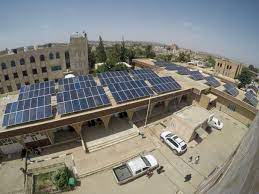The Kuwait Fund for Arab Economic Development and the United Nations Development Programme (UNDP) signed a new deal in which they will provide five hospitals in Yemen which is accessible to solar energy and build the capacity of the healthcare sector to deliver improved health outcomes amidst the crises.
Allowed ‘Renewable Energy for Improved Health Services Project in Yemen,’ the agreement between Kuwait Fund and UNDP will aim to ease the impact on healthcare facilities of frequent power-outages experienced across Yemen by installing solar microgrids that enable continuous functioning and reduce greenhouse gas emissions.
Yemen was considered the world’s worst humanitarian and development crisis. Since the eruption of the crisis, basic services of Yemen was not good, people were suffering from the severe setback with lack of access to energy representing a major challenge, especially vital healthcare,” said the Director-General of the Kuwait Fund.
This support comes within the framework of the State of Kuwait commitment announced at the 2021 Conference to Support the Humanitarian Situation in Yemen, providing a grant of US$ 20 million from the Kuwait Fund.
According to ‘Khalida Bouzar’ United Nations Assistant Secretary-Genera;l and Director of the Regional Bureau for the Arab States, UNDP, the Yemeni people are suffering for long from a crisis that is taking a tragic toll on lives and livelihoods.
Furthermore, they added that “We are thankful for this new collaboration that will help the hospitals to continue to function during the crises” — saving lives of people, boosting livelihoods and building the foundation for a green recovery once peace is achieved.
The aim of this partnership is to support the solarization of five hospitals, which are now offline and, when reactivated, will serve the critical health needs of 100,000 people.
Previously, the Kuwaiti fund supported the UNDP’s Wastewater Treatment Plant Project in Khan Younis, in the Gaza Strip through a US 3.6 million dollar grant and the Solid Waste Management Project for Syrian Refugees in Lebanon through a US 2.5 million dollar grant.

